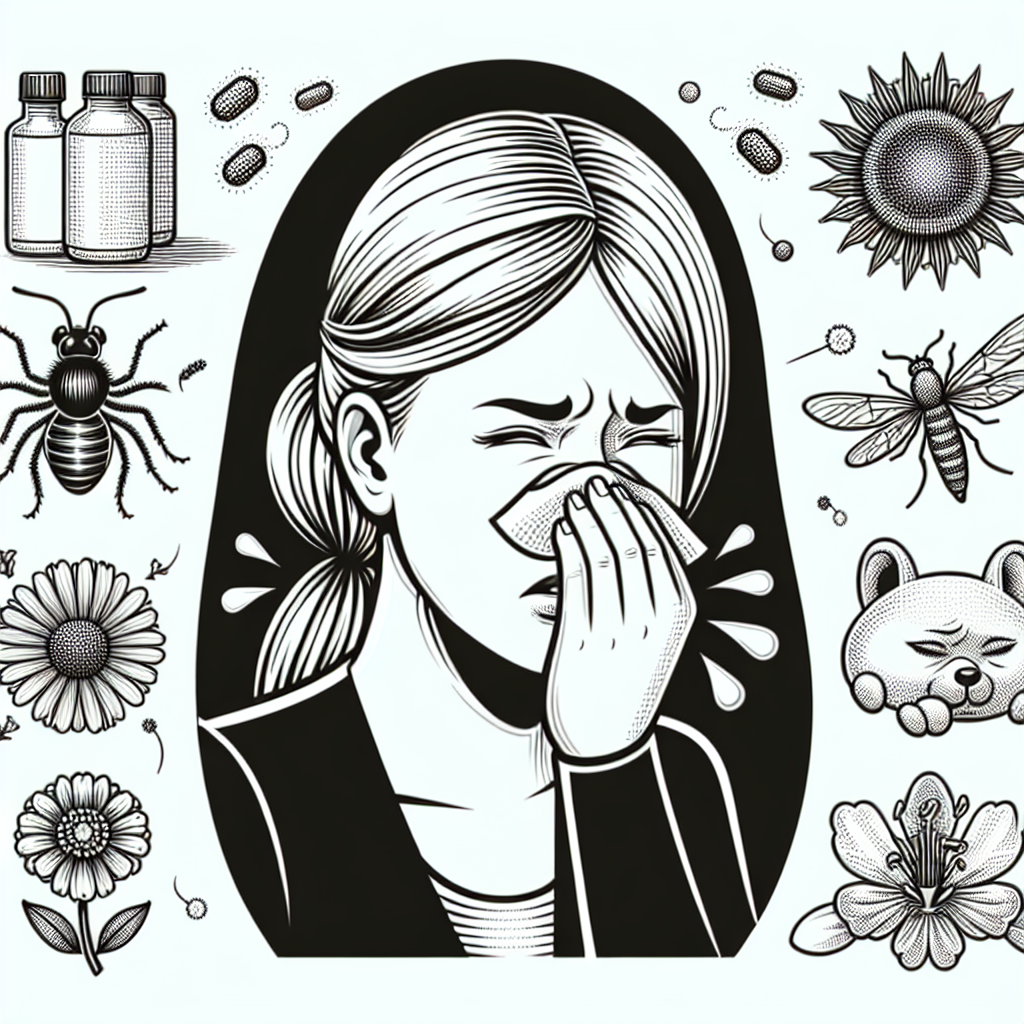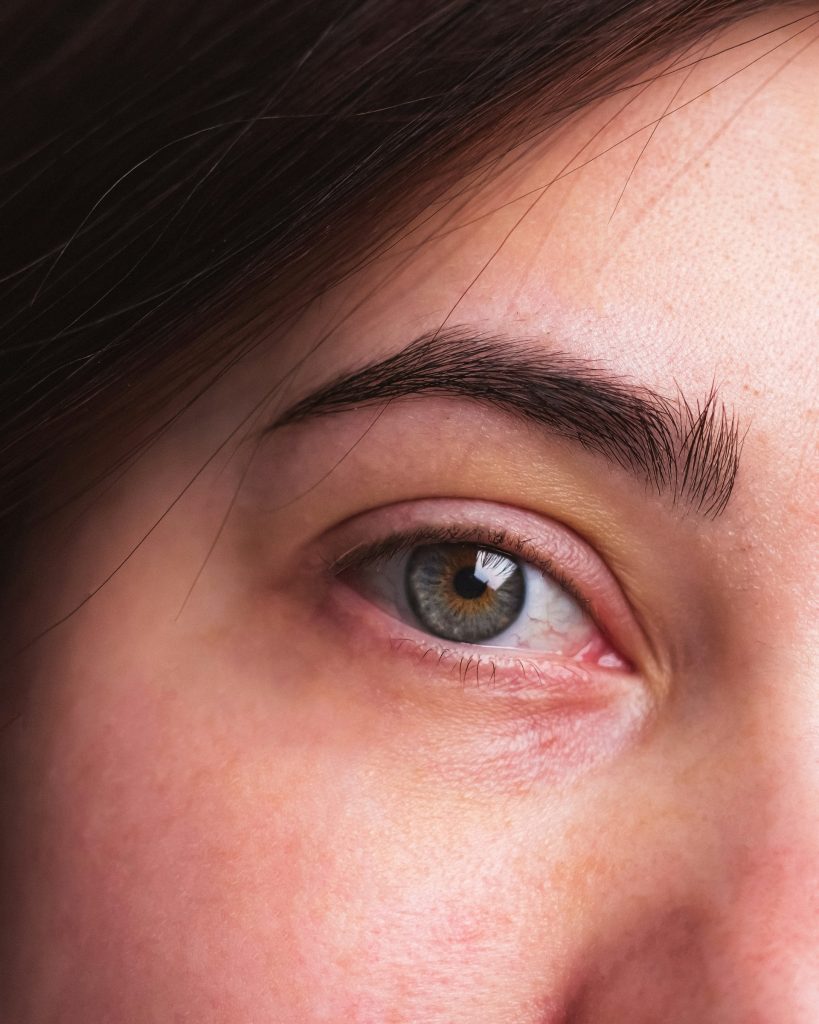Allergies affect different parts of our body and take many forms and manifestations. It is typically a recurrence in connection with an encounter with a particular allergen. When an allergy is suspected, it is very important to undergo an allergy examination and learn about the nature of your disease.
Allergic rhinitis (and conjunctivitis)
Allergic rhinitis is an inflammation of the nasal mucosa caused by an allergic reaction to a specific allergen, most commonly pollen, house dust mites, pets, moulds and various allergens from the work environment.
Allergic rhinitis is characterised by symptoms that are similar to the common cold:
1. sneezing (often in fits),
2. watery rhinitis,
3. itchy nose and palate,
4. stuffy nose, swelling of the nasal mucosa,
5. itchy, red and watery eyes.
Allergic symptoms arise quickly in response to contact with the allergen and resolve just as quickly when the allergen is removed. Seasonal allergic rhinitis (pollen allergy) is common and symptoms can last from March (sometimes February) to October. Year-round allergens (usually in the home or at work) cause a persistent cold, which is often more pronounced in the heating season.
Most individuals with allergic rhinitis have mild symptoms that can be easily and effectively treated. However, others may experience severe and persistent symptoms. They also experience sleep problems and other difficulties that interfere unpleasantly with daily life. A major risk of persistent untreated rhinitis is the development of bronchial asthma.


Allergic asthma
Allergic asthma is an inflammatory disease affecting the mucous membrane lining the lower airways (bronchi). This inflammation leads to increased irritability of the airways and, gradually, to a remodelling of the airway wall. Increased production of mucus is also an accompanying feature. Asthma occurs in both children and adults and has a wide variety of manifestations. The triggers of the problem vary greatly from patient to patient, e.g. inhalation of allergens, cold air, climate changes, agitation, exertion, stress, infections and many others.
Typical symptoms of allergic asthma:
- Attacks of shortness of breath at rest or on exertion accompanied by
- Wheezing, Irritating, unproductive cough,
- Coughing up small amounts of mucus at the end of an attack.
Other possible symptoms:
4. Shortness of breath on exertion,
5. Irritating cough (without feeling breathless),
6. A feeling of heaviness or pain in the chest.
Allergic skin reactions
In this case, it may not always be a true allergy – the symptom of hives is caused by the release of histamine, which is only released in some patients upon contact with an allergen. It can also be a spontaneous release after exposure to sunlight, physical exertion, or in a cold environment. However, these situations share the same symptoms (hives, angioedema) and the same treatment (antihistamines) as a “true” allergy.
There are several types of allergic skin reactions:
Hives (urticaria). Hives are characterized by itchy bumps of varying sizes with surrounding redness – sometimes large and merging. They can appear anywhere on the body. Most cases of these problems are referred to as acute and subside within a few days or weeks, but some people suffer from a chronic form of hives, the symptoms of which appear and disappear over a period of several months or years.
Angioedema. This is swelling that affects the deeper layers of the skin. It is usually not red or itchy and often affects the eyelids, lips, tongue, hands, and feet. Angioedema often occurs with hives, but it can also occur on its own.
Dermatitis. This is an inflammation of the skin that causes a red, scaly, and itchy rash. The most common types are atopic dermatitis and contact dermatitis. These symptoms develop gradually, not immediately after contact with the allergen, but often after several days or weeks. After repeated exposure to the allergen, the reaction is usually faster.
Atopic dermatitis (eczema) is a chronic skin disease that usually begins in infancy or early childhood and is often associated with food allergies, allergic rhinitis, and asthma. Certain foods can trigger eczema, especially in young children. Skin staphylococcal infections can also cause eczema flare-ups in children. Other possible triggers include animal hair allergens, dust mites, sweating, or contact with irritants such as wool or soap. The main goal of treatment is to suppress inflammation in the skin and prevent uncomfortable itching.
Allergic contact dermatitis occurs when the skin comes into direct contact with an allergen. For example, if an individual is allergic to nickel and their skin comes into contact with jewelry made from even a very small amount of this metal, red, bumpy, scaly, itchy, or swollen skin may appear at the site of contact.
Food allergies
Food allergies are very common in early childhood, when they are often associated with severe digestive problems and eczema. In adulthood, only about 2–3% of the population suffers from true food allergies; various types of non-immunological food intolerances are much more common.
True food allergies can manifest themselves in a variety of symptoms, such as:
- Digestive problems associated with vomiting, cramps, and diarrhea,
- Allergic rhinitis,
- Asthma,
- Hives,
- The most serious reaction being anaphylactic shock.
A very common but usually harmless reaction is a cross-reaction to certain foods (fruit, vegetables, nuts) in patients with pollen allergies. This manifests as oral allergy syndrome (OAS) – itching and irritation of the mucous membrane in the mouth after eating raw fruit. Because OAS is not limited to the pollen season, it can affect patients throughout the year if they consume the food in question.
Sources:
https://my.clevelandclinic.org/health/diseases/21461-allergic-asthma
https://www.asthma.org.uk/advice/understanding-asthma/symptoms
https://www.aaaai.org/tools-for-the-public/conditions-library/allergies/allergic-skin-conditions
https://www.aaaai.org/Conditions-Treatments/Allergies/Skin-Allergy
https://www.mayoclinic.org/diseases-conditions/food-allergy/symptoms-causes/syc-20355095
https://www.everydayhealth.com/digestive-health/experts-how-do-food-allergies-affect-digestion.aspx



Leave a Reply